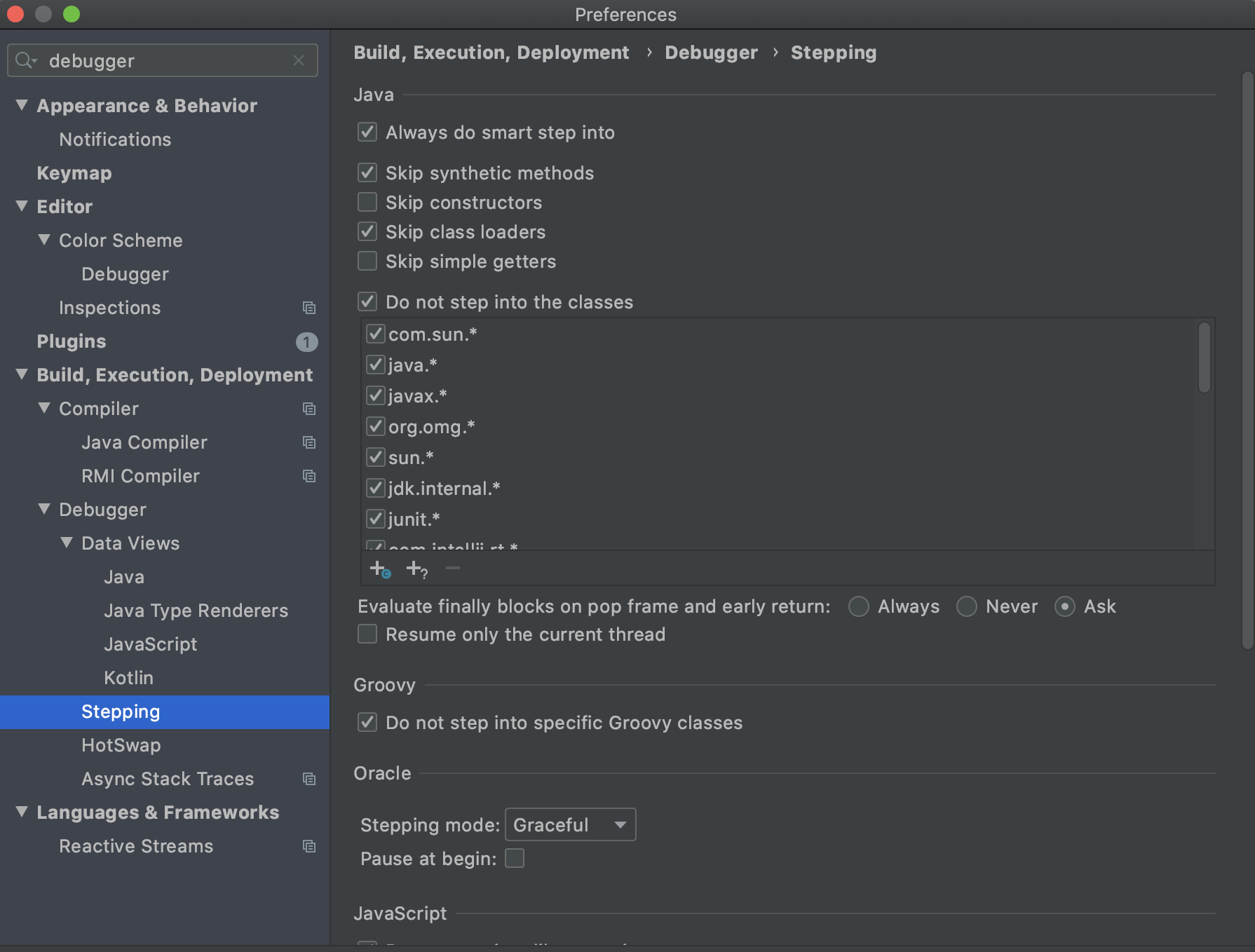Hacking the JDK
How to build your corretto JDK
Let us git clone the master branch, otherwise the default is develop.
❯ git clone [email protected]:corretto/corretto-11.git --masterGiving a quick look at what the repo is made off we see
corretto-11❯ tree -L 2
..
├── ADDITIONAL_LICENSE_INFO
├── ASSEMBLY_EXCEPTION
├── CHANGELOG.md
├── CODE_OF_CONDUCT.md
├── LICENSE
├── README.md
├── TRADEMARKS.md
├── amazon-cacerts
├── build.gradle
├── gradle
│ └── wrapper
├── gradle.properties
├── gradlew
├── gradlew.bat
├── installers
│ ├── linux
│ ├── mac
│ └── windows
├── settings.gradle
├── src
│ ├── ADDITIONAL_LICENSE_INFO
│ ├── ASSEMBLY_EXCEPTION
│ ├── LICENSE
│ ├── Makefile
│ ├── README
│ ├── bin
│ ├── build
│ ├── configure
│ ├── doc
│ ├── make
│ ├── src
│ └── test
└── version.txtSo interestingly, corretto installers appears to be built with gradle, let’s skip that part for now and directly try to build the OpenJDK sources.
For that let’s go in the src/ folder, open the building documentation,
available either as markdown (doc/building.md) or as an html doc/building.html file.
The impatient should really read the TLDR of this documentation.
The first step would be to configure the build. I already have the bare minimum
requirement : make, autoconf, bash and XCode.
However, I encountered this error
corretto-11/src❯ bash configure
...
configure: error: No xcodebuild tool and no system framework headers found, use --with-sysroot or --with-sdk-name to provide a path to a valid SDK
...All I had to do was to select the current XCode tooling, this command wasn’t properly documented in the building doc.
❯ sudo xcode-select --switch /Applications/Xcode.app/Contents/Developercorretto-11/src❯ bash configure
...
configure: Found potential Boot JDK using /usr/libexec/java_home
configure: Potential Boot JDK found at /Library/Java/JavaVirtualMachines/openjdk-13.0.2.jdk/Contents/Home is incorrect JDK version (openjdk version "13.0.2" 2020-01-14); ignoring
configure: (Your Boot JDK version must be one of: 10 11)
Unable to find any JVMs matching version "1.9".
configure: Found potential Boot JDK using /usr/libexec/java_home -v 1.9
configure: Potential Boot JDK found at /Library/Java/JavaVirtualMachines/openjdk-13.0.2.jdk/Contents/Home is incorrect JDK version (openjdk version "13.0.2" 2020-01-14); ignoring
configure: (Your Boot JDK version must be one of: 10 11)
Unable to find any JVMs matching version "1.8".
configure: Found potential Boot JDK using /usr/libexec/java_home -v 1.8
configure: Potential Boot JDK found at /Library/Java/JavaVirtualMachines/openjdk-13.0.2.jdk/Contents/Home is incorrect JDK version (openjdk version "13.0.2" 2020-01-14); ignoring
configure: (Your Boot JDK version must be one of: 10 11)
Unable to find any JVMs matching version "1.7".
configure: Found potential Boot JDK using /usr/libexec/java_home -v 1.7
configure: Potential Boot JDK found at /Library/Java/JavaVirtualMachines/openjdk-13.0.2.jdk/Contents/Home is incorrect JDK version (openjdk version "13.0.2" 2020-01-14); ignoring
configure: (Your Boot JDK version must be one of: 10 11)
checking for javac... /Users/bric3/.asdf/shims/javac
checking for java... /Users/bric3/.asdf/shims/java
configure: Found potential Boot JDK using well-known locations (in /Library/Java/JavaVirtualMachines/openjdk-13.0.2.jdk)
configure: Potential Boot JDK found at /Library/Java/JavaVirtualMachines/openjdk-13.0.2.jdk/Contents/Home is incorrect JDK version (openjdk version "13.0.2" 2020-01-14); ignoring
configure: (Your Boot JDK version must be one of: 10 11)
configure: Could not find a valid Boot JDK. You might be able to fix this by running 'brew cask install java'.
configure: This might be fixed by explicitly setting --with-boot-jdk
configure: error: Cannot continue
configure exiting with result code 1Then another constraint is the need for an N or N-1 jdk to be present to be able
to build the JDK sources. In my setup I use brew to install the latest java, at this time java 13,
to run java apps, and I use a distribution manager to manage different JDK versions for development
purpose, like java 11 or java 8. Currently, I’m experimenting with asdf-vm.
From the logs configure sees the asdf shims, but doesn’t know where this JDK is located.
Use your sdk environment mmanagement to get the java home
-
$(jenv javahome) -
$(asdf where java amazon-corretto-11.0.6.10.1-2) -
etc.
Finally configure works.
corretto-11/src❯ bash configure --with-boot-jdk=$(asdf where java amazon-corretto-11.0.6.10.1-2)
...
checking if build directory is on local disk... yes
checking JVM features for JVM variant 'server'... "aot cds cmsgc compiler1 compiler2 dtrace epsilongc g1gc graal jfr jni-check jvmci jvmti management nmt parallelgc serialgc services vm-structs"
configure: creating /Users/bric3/opensource/corretto-11/src/build/macosx-x86_64-normal-server-release/configure-support/config.status
config.status: creating /Users/bric3/opensource/corretto-11/src/build/macosx-x86_64-normal-server-release/spec.gmk
config.status: creating /Users/bric3/opensource/corretto-11/src/build/macosx-x86_64-normal-server-release/bootcycle-spec.gmk
config.status: creating /Users/bric3/opensource/corretto-11/src/build/macosx-x86_64-normal-server-release/buildjdk-spec.gmk
config.status: creating /Users/bric3/opensource/corretto-11/src/build/macosx-x86_64-normal-server-release/compare.sh
config.status: creating /Users/bric3/opensource/corretto-11/src/build/macosx-x86_64-normal-server-release/Makefile
====================================================
A new configuration has been successfully created in
/Users/bric3/opensource/corretto-11/src/build/macosx-x86_64-normal-server-release
using configure arguments '--with-boot-jdk=/Users/bric3/.asdf/installs/java/amazon-corretto-11.0.6.10.1-2'.
Configuration summary:
* Debug level: release
* HS debug level: product
* JVM variants: server
* JVM features: server: 'aot cds cmsgc compiler1 compiler2 dtrace epsilongc g1gc graal jfr jni-check jvmci jvmti management nmt parallelgc serialgc services vm-structs'
* OpenJDK target: OS: macosx, CPU architecture: x86, address length: 64
* Version string: 11.0.6-internal+0-adhoc.bric3.src (11.0.6-internal)
Tools summary:
* Boot JDK: openjdk version "11.0.6" 2020-01-14 LTS OpenJDK Runtime Environment Corretto-11.0.6.10.1 (build 11.0.6+10-LTS) OpenJDK 64-Bit Server VM Corretto-11.0.6.10.1 (build 11.0.6+10-LTS, mixed mode) (at /Users/bric3/.asdf/installs/java/amazon-corretto-11.0.6.10.1-2)
* Toolchain: clang (clang/LLVM from Xcode 11.3.1)
* C Compiler: Version 11.0.0 (at /usr/bin/clang)
* C++ Compiler: Version 11.0.0 (at /usr/bin/clang++)
Build performance summary:
* Cores to use: 8
* Memory limit: 16384 MBIt’s possible to tweak the configuration by looking at the §common configure arguments
however it may require additional dependencies. Also some build options are not enabled
by default, e.g. on JDK 11u if you want to play around with Shenandoah GC, the build
configuration needs to be configured with --with-jvm-features=shenandoahgc.
Let’s start spinning the fans:
❯ make images
Building target 'images' in configuration 'macosx-x86_64-normal-server-release'
Compiling 8 files for BUILD_TOOLS_LANGTOOLS
Warning: No SCM configuration present and no .src-rev
Parsing 2 properties into enum-like class for jdk.compiler
Compiling 13 properties into resource bundles for jdk.javadoc
Compiling 12 properties into resource bundles for jdk.jdeps
Compiling 7 properties into resource bundles for jdk.jshell
Compiling 19 properties into resource bundles for jdk.compiler
Compiling 117 files for BUILD_java.compiler.interim
Creating hotspot/variant-server/tools/adlc/adlc from 13 file(s)
Compiling 2 files for BUILD_JVMTI_TOOLS
Compiling 1 files for BUILD_JFR_TOOLS
...
Compiling 224 properties into resource bundles for jdk.localedata
Compiling 90 properties into resource bundles for java.desktop
Compiling 2982 files for java.base
...
Compiling 1586 files for jdk.internal.vm.compiler
...
Creating support/modules_libs/java.base/libverify.dylib from 2 file(s)
Creating support/modules_libs/java.base/libjava.dylib from 60 file(s)
...
Creating images/jmods/jdk.management.agent.jmod
Creating images/jmods/jdk.management.jfr.jmod
Creating images/jmods/jdk.naming.dns.jmod
...
Creating jdk image
Stopping sjavac server
Finished building target 'images' in configuration 'macosx-x86_64-normal-server-release'The process took ~20 min on my laptop (16GB 2,7 GHz Quad-Core Intel Core i7) with 2 active browser and many tabs opened, slack, intellij, and other apps running.
Let’s try to see if it worked :
coretto-11/src❯ build/macosx-x86_64-normal-server-release/images/jdk/bin/java --version
openjdk 11.0.6-internal 2020-01-14
OpenJDK Runtime Environment (build 11.0.6-internal+0-adhoc.bric3.src)
OpenJDK 64-Bit Server VM (build 11.0.6-internal+0-adhoc.bric3.src, mixed mode)Other things are possible, like only building hotspot (the actual JVM).
coretto-11/src❯ make help
OpenJDK Makefile help
=====================
Common make targets
make [default] # Compile all modules and create a runnable "exploded"
# image (alias for jdk or exploded-image)
make all # Create all images: product, test, docs
# (alias for all-images)
make images # Create a complete jdk image
# (alias for product-images)
...
Targets for Hotspot
make hotspot # Build all of hotspot
make hotspot-<variant> # Build just the specified jvm variant
make hotspot-gensrc # Only build the gensrc part of hotspot
make hotspot-<variant>-<phase> # Build the specified phase for the variant
...Opening the JDK in IntelliJ.
Now let us navigate the code base using IntelliJ IDEA, for that just run
coretto-11/src❯ bash bin/idea.sh
FATAL: cannot find ant. Try setting ANT_HOME.I finally got rid of ant for it to come back this way. Let’s brew install ant and rerun idea.sh
coretto-11/src❯ bash bin/idea.sh
mkdir: /Users/bric3/opensource/corretto-11/src/.idea: File existsThe tool complains that this folder already exists, it’s a nice thing to prevent
this script to overwrite this folder as IntelliJ IDEA may add or modify some of these files.
In my case I just remote it since they were incorrect. Also, if for some reason
bin/idea.sh does not pick up ant, you could always set ANT_HOME it this way, that’s
what I had to do:
coretto-11/src❯ rm -rf .idea
coretto-11/src❯ ANT_HOME=/usr/local/opt/ant/libexec/ bash bin/idea.shOpen Idea, I’m using the shell launcher that is installed by the jetbrains toolbox installer.
coretto-11/src❯ idea .And voilà
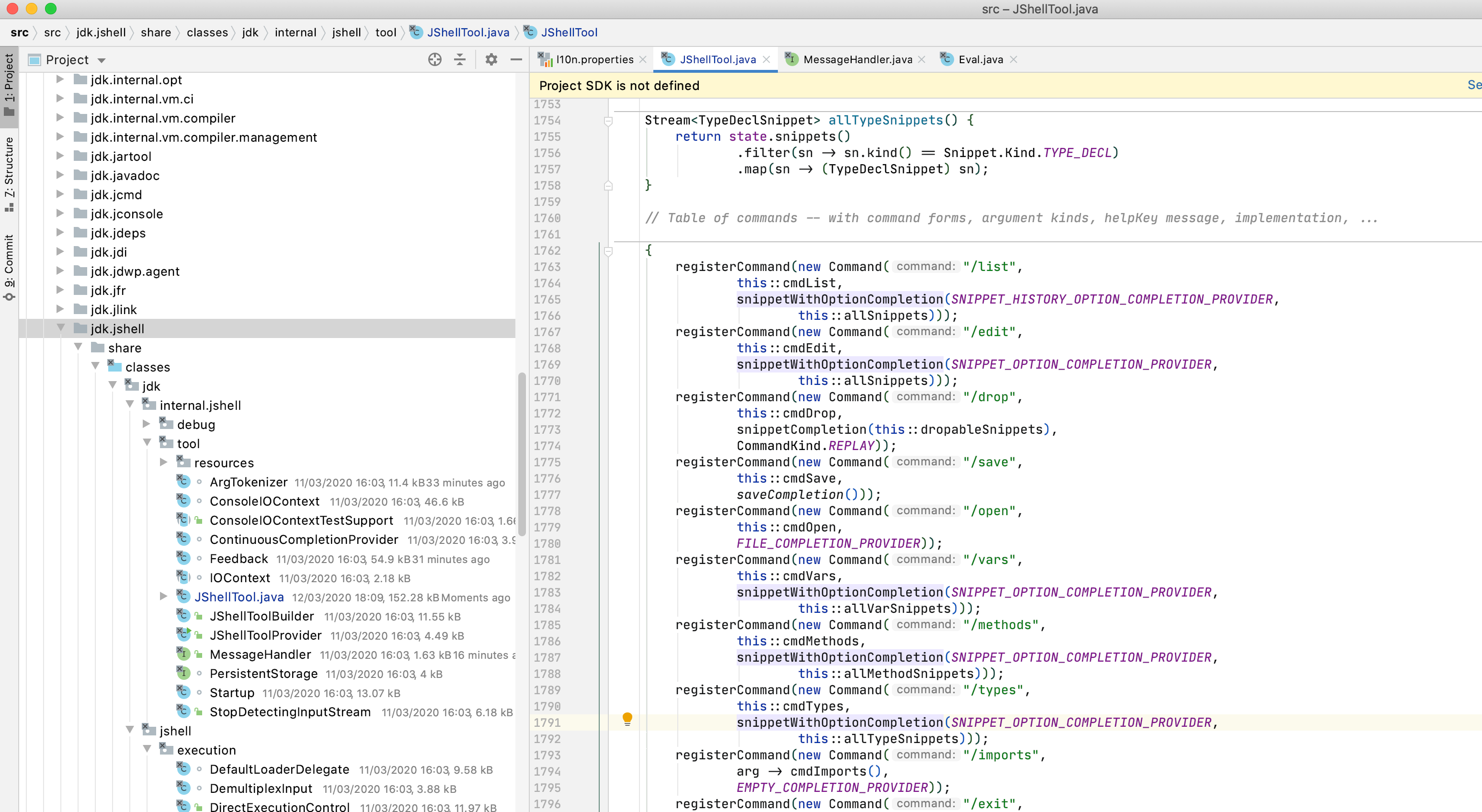
One thing I noticed is that the project has been set for Java 9 language level,
but some Java code actually have language features from Java 10, like var.
So I had to increase the project language level.

Let’s play with the jdk
Quickly hack something in jshell (part 1)
I always have the habit to type /quit within jshell, let’s see how to add an alias to
/exit
Let’s explore the code base by searching a specific text, like the one in the /help intro
like
The jshell tool allows you to execute Java code, getting immediate results.
This can be found here, in src/jdk.jshell/share/classes/jdk/internal/jshell/tool/resources/l10n.properties
help.intro =\
The jshell tool allows you to execute Java code, getting immediate results.\n\
You can enter a Java definition (variable, method, class, etc), like: int x = 8\n\
or a Java expression, like: x + x\n\
or a Java statement or import.\n\
These little chunks of Java code are called 'snippets'.\nfollowing the resource eky we can stumble on src/src/jdk.jshell/share/classes/jdk/internal/jshell/tool/JShellTool.java
and this code especially
registerCommand(new Command("intro",
"help.intro",
CommandKind.HELP_SUBJECT));Quickly hacking a duplicate command of the actual /exit to register the
additional /quit…
diff --git i/src/src/jdk.jshell/share/classes/jdk/internal/jshell/tool/JShellTool.java w/src/src/jdk.jshell/share/classes/jdk/internal/jshell/tool/JShellTool.java
index 9ccb4e888..73cb61ff6 100644
--- i/src/src/jdk.jshell/share/classes/jdk/internal/jshell/tool/JShellTool.java
+++ w/src/src/jdk.jshell/share/classes/jdk/internal/jshell/tool/JShellTool.java
@@ -41,7 +41,6 @@ import java.lang.module.ModuleDescriptor;
import java.lang.module.ModuleFinder;
import java.lang.module.ModuleReference;
import java.net.MalformedURLException;
-import java.net.URI;
import java.net.URISyntaxException;
import java.net.URL;
import java.nio.charset.Charset;
@@ -260,6 +259,19 @@ public class JShellTool implements MessageHandler {
Map<Snippet, SnippetInfo> mapSnippet;
+ private List<Suggestion> exitCompletionSuggestions(String sn, int c, int[] a) {
+ if (analysis == null || sn.isEmpty()) {
+// No completions if uninitialized or snippet not started
+ return Collections.emptyList();
+ } else {
+// Give exit code an int context by prefixing the arg
+ List<Suggestion> suggestions = analysis.completionSuggestions(INT_PREFIX + sn,
+ INT_PREFIX.length() + c, a);
+ a[0] -= INT_PREFIX.length();
+ return suggestions;
+ }
+ }
+
// Kinds of compiler/runtime init options
private enum OptionKind {
CLASS_PATH("--class-path", true),
@@ -1782,19 +1794,11 @@ public class JShellTool implements MessageHandler {
arg -> cmdImports(),
EMPTY_COMPLETION_PROVIDER));
registerCommand(new Command("/exit",
- arg -> cmdExit(arg),
- (sn, c, a) -> {
- if (analysis == null || sn.isEmpty()) {
- // No completions if uninitialized or snippet not started
- return Collections.emptyList();
- } else {
- // Give exit code an int context by prefixing the arg
- List<Suggestion> suggestions = analysis.completionSuggestions(INT_PREFIX + sn,
- INT_PREFIX.length() + c, a);
- a[0] -= INT_PREFIX.length();
- return suggestions;
- }
- }));
+ this::cmdExit,
+ this::exitCompletionSuggestions));
+ registerCommand(new Command("/quit",
+ this::cmdExit,
+ this::exitCompletionSuggestions));
registerCommand(new Command("/env",
arg -> cmdEnv(arg),
envCompletion()));Recompile the images.
coretto-11/src❯ make images
Building target 'images' in configuration 'macosx-x86_64-normal-server-release'
Warning: No SCM configuration present and no .src-rev
Compiling 94 files for jdk.jshell
Creating images/jmods/jdk.jshell.jmod
Creating images/jmods/java.base.jmod
Creating jdk image
Stopping sjavac server
Finished building target 'images' in configuration 'macosx-x86_64-normal-server-release'and discover the result
coretto-11/src❯ build/macosx-x86_64-normal-server-release/images/jdk/bin/jshell
| Welcome to JShell -- Version 11.0.6-internal
| For an introduction type: /help intro
jshell> /quit
| GoodbyeJobs done !
Quickly hack something in jshell (part 2)
Now I’d like something easier to work with, creating images makes the feedback
loop too long, and I cannot debug the program which is cumbersome.
First we need to set the JDK in the project, which is not another JDK but this JDK
(otherwise the classes that will be loaded will be from the SDK not from the JDK sources).
The JDK we want can be found at this location, after the make images
But we need the jdk target
corretto-11/src/build/macosx-x86_64-normal-server-release/jdk
which includes java
corretto-11/src❯ tree -L 1 build/macosx-x86_64-normal-server-release/jdk/bin build/macosx-x86_64-normal-server-release/jdk/bin ... ├── jarsigner ├── jarsigner.dSYM ├── java ├── javac ├── javac.dSYM ├── javadoc ├── javadoc.dSYM ...
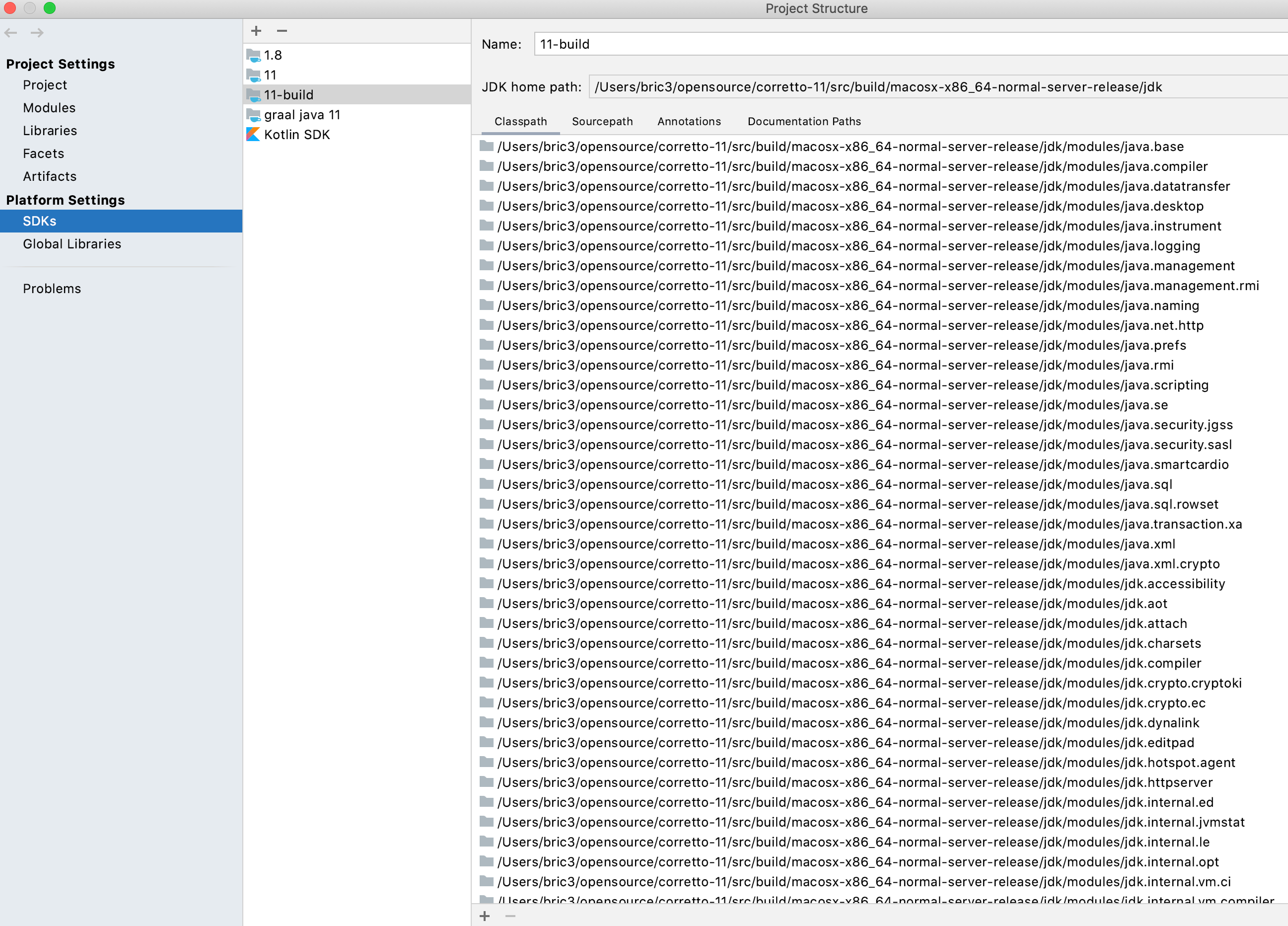
That the JDK we need to add to IntelliJ and to set to the current project.
Now let’s find something to run like a main method, hopefully for jshell (<kbd>cmd</kbd> + <kbd>alt</kbd> + <kbd>o</kbd>)
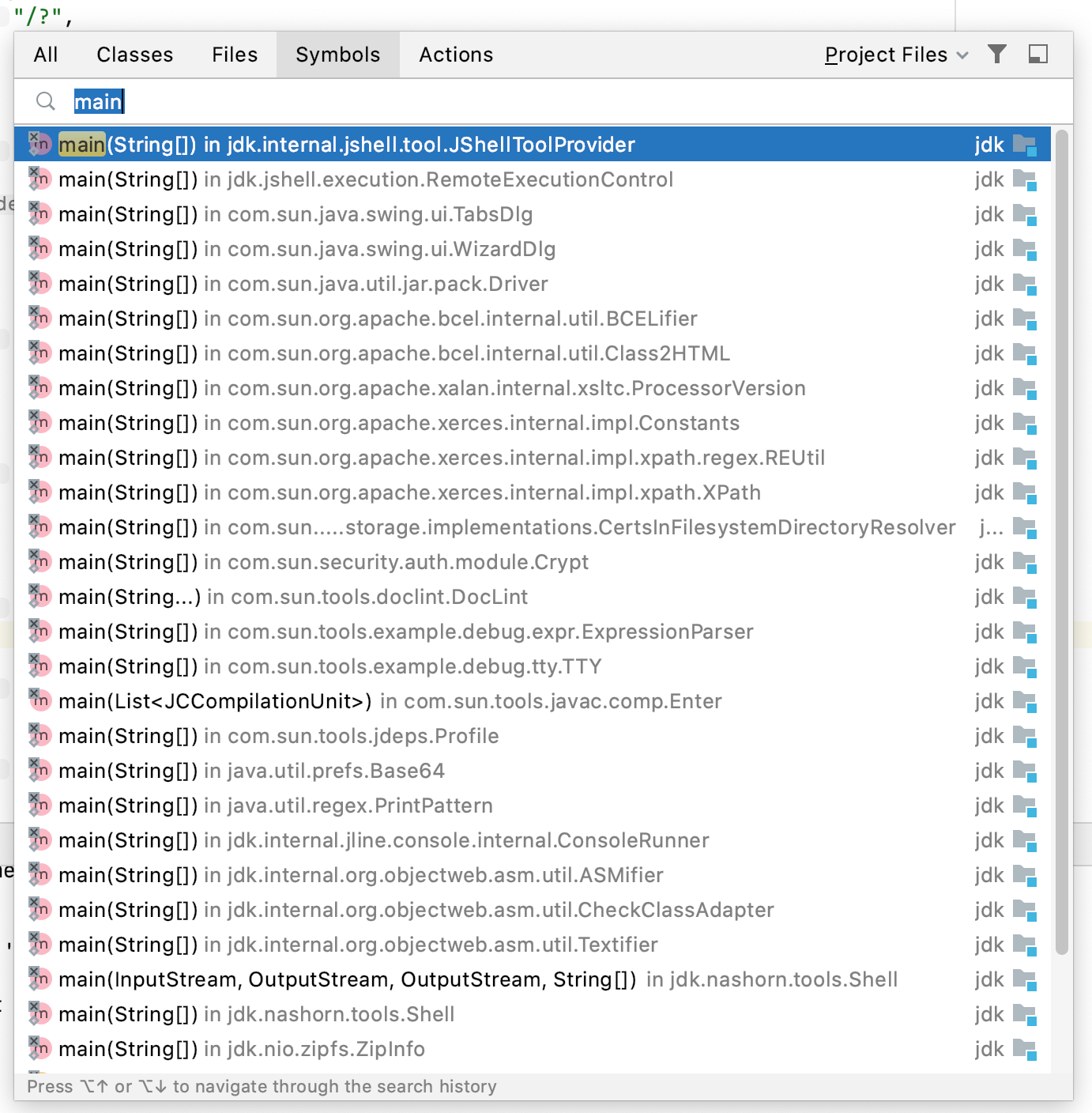
There’s one, let then run jdk.internal.jshell.tool.JShellToolProvider#main

Later in JShellTool we can find this method, let’s set a break point to see how
commands are being processed.
/**
* Process a command (as opposed to a snippet) -- things that start with
* slash.
*
* @param input
*/
private void processCommand(String input) {
if (input.startsWith("/-")) {At boot strap we see a lot of /set commands, so it may be necessary to toggle the breakpoint once
the init phase is over.
-
/set mode verbose -command -
/set prompt verbose '\njshell> ' ' …> ' -
/set format verbose pre '| ' -
/set format verbose post '%n' -
/set format verbose errorpre '| ' -
/set format verbose errorpost '%n' -
/set format verbose errorline '{post}{pre} {err}' -
/set format verbose action 'created' added-primary -
… -
/set format verbose typeKind 'interface' interface -
…
I’m not sure yet how to use the build command within IntelliJ IDEA yet,
and my modifications were not being compiled to the jdk build at corretto-11/src/build/macosx-x86_64-normal-server-release/jdk.
But if we are not generating the images, which is what we want, there’s this make
target that is faster.
corretto/src❯ make jdk
Building target 'jdk' in configuration 'macosx-x86_64-normal-server-release'
Warning: No SCM configuration present and no .src-rev
Compiling 94 files for jdk.jshell
Stopping sjavac server
Finished building target 'jdk' in configuration 'macosx-x86_64-normal-server-release'But there’s more focuses commands, inspecting the Makefile and other gnu makefiles (make/*gmk)
there’s this task that is interesting
corretto/src❯ make print-targets | tr " " "\n"And focusing on jshell, shows even more specific tasks
corretto/src❯ make print-targets | tr " " "\n" | grep jshell
clean-jdk.jshell
clean-jdk.jshell-gensrc
clean-jdk.jshell-include
clean-jdk.jshell-java
clean-jdk.jshell-native
jdk.jshell
jdk.jshell-gensrc
jdk.jshell-gensrc-moduleinfo
jdk.jshell-gensrc-moduleinfo-only
jdk.jshell-gensrc-only
jdk.jshell-gensrc-src
jdk.jshell-gensrc-src-only
jdk.jshell-java
jdk.jshell-java-only
jdk.jshell-jmod
jdk.jshell-jmod-only
jdk.jshell-launchers
jdk.jshell-launchers-only
jdk.jshell-only
corretto/src❯ make jdk.jshell
Building target 'jdk.jshell' in configuration 'macosx-x86_64-normal-server-release'
Compiling 396 files for BUILD_jdk.compiler.interim
Compiling 299 files for BUILD_jdk.javadoc.interim
Compiling 400 files for jdk.compiler
Stopping sjavac server
Finished building target 'jdk.jshell' in configuration 'macosx-x86_64-normal-server-release'The compilation appear to be incremental, and doesn’t recompile every JDK modules which is somewhat sufficient to shorten significantly the feedback loop.
_Also, at the time of writing there’s a Makefile plugin for IntelliJ IDEA, and it’s possible to
create a Run configuration that execute any makefile target, this run configuration can be executed
before the JShellToolProvider.
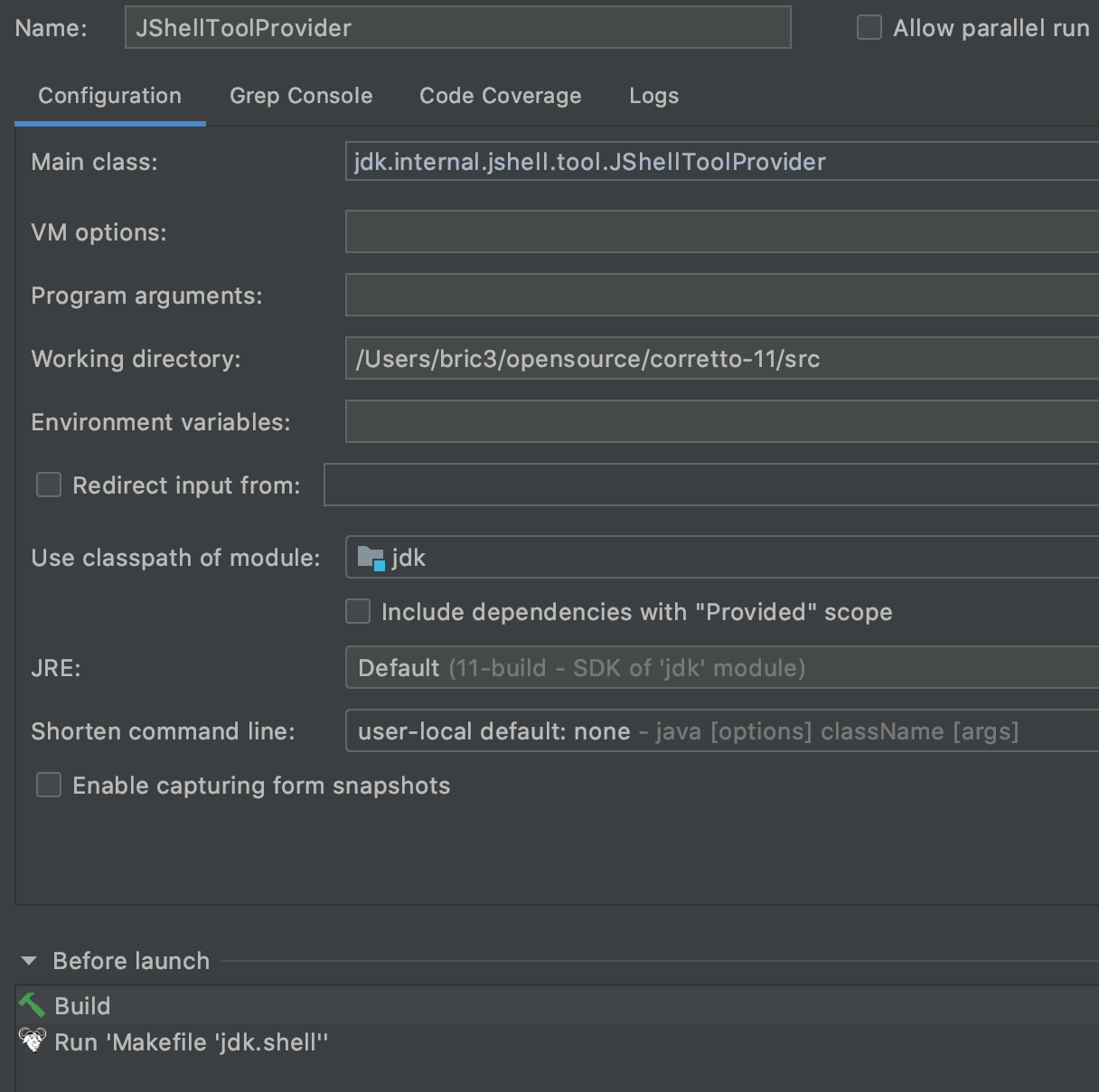
Now let’s get something a tad more involved.
Extending the jshell repl to support new map syntax sugar
Currently, jshell requires writing correct java code as defined for Java 11, e.g.
jshell> var m = Map.of("k1", "v1", "k2", "v2");
m ==> {k2=v2, k1=v1}
jshell> m.get("k2")
$4 ==> "v2"What I would like is to be able to write
jshell> var m = { "k1", "v1", "k2", "v2" }
m ==> {k2=v2, k1=v1}
jshell> m["k2"]
$4 ==> "v2"Discovering how the repl work
This is likely to happen in some parser, why not inspect jdk.jshell.ReplParser, it has two public methods
public ReplParser(ParserFactory fac,
com.sun.tools.javac.parser.Lexer S,
boolean keepDocComments,
boolean keepLineMap,
boolean keepEndPositions,
boolean forceExpression)parseCompilationUnit()This method which happens to be an override of
com.sun.tools.javac.parser.JavacParser.parseCompilationUnit.
I don’t have any reflexes when it comes to navigate this code base, so let’s put a breakpoint in this method a start
the evaluation of a statement like String s = "s" in debug mode.
|
IntelliJ IDEA disables step into (F7) in debug mode for types/methods that are in some packages unfortunately this setting is global and not per project, so you may need to toggle this options if switching between different projects.
|
So here’s what the break point leads to
parseCompilationUnit:94, ReplParser (jdk.jshell) (1)
parse:639, JavaCompiler (com.sun.tools.javac.main) (2)
parse:676, JavaCompiler (com.sun.tools.javac.main)
parseFiles:1026, JavaCompiler (com.sun.tools.javac.main)
parseInternal:249, JavacTaskImpl (com.sun.tools.javac.api) (3)
call:-1, 1278254413 (com.sun.tools.javac.api.JavacTaskImpl$$Lambda$214)
handleExceptions:147, JavacTaskImpl (com.sun.tools.javac.api)
parse:243, JavacTaskImpl (com.sun.tools.javac.api)
parse:356, TaskFactory$ParseTask (jdk.jshell)
<init>:345, TaskFactory$ParseTask (jdk.jshell)
lambda$parse$0:144, TaskFactory (jdk.jshell)
apply:-1, 1359953204 (jdk.jshell.TaskFactory$$Lambda$203)
lambda$runTask$4:213, TaskFactory (jdk.jshell)
withTask:-1, 770947228 (jdk.jshell.TaskFactory$$Lambda$205)
getTask:182, JavacTaskPool (com.sun.tools.javac.api)
runTask:206, TaskFactory (jdk.jshell)
parse:140, TaskFactory (jdk.jshell)
parse:238, TaskFactory (jdk.jshell)
lambda$scan$1:90, CompletenessAnalyzer (jdk.jshell)
apply:-1, 428566321 (jdk.jshell.CompletenessAnalyzer$$Lambda$193)
disambiguateDeclarationVsExpression:688, CompletenessAnalyzer$Parser (jdk.jshell)
parseUnit:632, CompletenessAnalyzer$Parser (jdk.jshell)
scan:91, CompletenessAnalyzer (jdk.jshell)
analyzeCompletion:183, SourceCodeAnalysisImpl (jdk.jshell)
isComplete:115, ConsoleIOContext$2 (jdk.internal.jshell.tool)
add:172, EditingHistory (jdk.internal.jline.extra)
finishBuffer:738, ConsoleReader (jdk.internal.jline.console)
accept:2030, ConsoleReader (jdk.internal.jline.console)
readLine:2756, ConsoleReader (jdk.internal.jline.console)
readLine:2383, ConsoleReader (jdk.internal.jline.console)
readLine:2371, ConsoleReader (jdk.internal.jline.console)
readLine:142, ConsoleIOContext (jdk.internal.jshell.tool)
getInput:1273, JShellTool (jdk.internal.jshell.tool)
run:1186, JShellTool (jdk.internal.jshell.tool) (4)
start:987, JShellTool (jdk.internal.jshell.tool)
start:254, JShellToolBuilder (jdk.internal.jshell.tool)
main:120, JShellToolProvider (jdk.internal.jshell.tool)| 1 | Break point |
| 2 | Starts the unit parsing |
| 3 | Starts the whole parsing |
| 4 | Handles the input |
Here’s some interesting elements executing before, as expected JShellTool
will handle the input, then at some point jshell configures the java compiler
to parse the input. Especially parseInternal that is configured with files (FileObject)
private Iterable<? extends CompilationUnitTree> parseInternal() {
try {
prepareCompiler(true);
List<JCCompilationUnit> units = compiler.parseFiles(args.getFileObjects());
for (JCCompilationUnit unit: units) {
JavaFileObject file = unit.getSourceFile();
if (notYetEntered.containsKey(file))
notYetEntered.put(file, unit);
}
return units;
}In reality jshell uses an internal memory store to represent these file objects - I’ve already
used this API 10 years ago in this blog entry about memory leaks,
sorry it’s in french -, here’s the .toString() of the single file object.
WrappedJavaFileObject[jdk.jshell.MemoryFileManager$SourceMemoryJavaFileObject[string:///$NeverUsedName$.java]]
Then the unit is parsed by the JavaCompiler class.
protected JCCompilationUnit parse(JavaFileObject filename, CharSequence content) {
long msec = now();
JCCompilationUnit tree = make.TopLevel(List.nil());
if (content != null) {
if (verbose) {
log.printVerbose("parsing.started", filename);
}
if (!taskListener.isEmpty()) {
TaskEvent e = new TaskEvent(TaskEvent.Kind.PARSE, filename);
taskListener.started(e);
keepComments = true;
genEndPos = true;
}
Parser parser = parserFactory.newParser(content, keepComments(), genEndPos,
lineDebugInfo, filename.isNameCompatible("module-info", Kind.SOURCE));
tree = parser.parseCompilationUnit();The Parser object is a ReplParser that extends com.sun.tools.javac.parser.JavacParser, on which
the parseCompilationUnit is invoked. the javadoc of this method indicates this method mimic the one
from the actual Java compiler to allow the compilation of stand-alone snippets.
/**
* As faithful a clone of the overridden method as possible while still
* achieving the goal of allowing the parse of a stand-alone snippet.
* As a result, some variables are assigned and never used, tests are
* always true, loops don't, etc. This is to allow easy transition as the
* underlying method changes.
* @return a snippet wrapped in a compilation unit
*/
@Override
public JCCompilationUnit parseCompilationUnit() {Now let’s debug a bit. The parser eat tokens until TokenKind.EOF, then form
a ReplUnit from the snippet, and during this phase the String variable declaration
goes through an interesting method variableInitializer.
variableInitializer:2323, JavacParser (com.sun.tools.javac.parser)
variableDeclaratorRest:3054, JavacParser (com.sun.tools.javac.parser)
variableDeclaratorsRest:3024, JavacParser (com.sun.tools.javac.parser)
replUnit:237, ReplParser (jdk.jshell)
parseCompilationUnit:120, ReplParser (jdk.jshell)
...
main:120, JShellToolProvider (jdk.internal.jshell.tool)/** VariableInitializer = ArrayInitializer | Expression
*/
public JCExpression variableInitializer() {
return token.kind == LBRACE ? arrayInitializer(token.pos, null) : parseExpression();
}What is interesting there, is that this method explicitly checks for a left brace to perform
specific initialization, actually the one we now for arrays. In the current debugging it’s a
string literal, so this method will evaluate the parseExpression method.
Hacking the javac parser
Inspecting how the parser is doing for the array, we notice that for the token king LBRACE
the parser creates a specific JCExpression.
/** ArrayInitializer = "{" [VariableInitializer {"," VariableInitializer}] [","] "}"
*/
JCExpression arrayInitializer(int newpos, JCExpression t) {
List<JCExpression> elems = arrayInitializerElements(newpos, t);
return toP(F.at(newpos).NewArray(t, List.nil(), elems));
}Notice the NewArray(…) method, this method creates a new tree, new JCNewArray(elemtype, dims, elems)
for this expression. JCNewArray implements the tree interface NewArrayTree that has the Tree.Kind.NEW_ARRAY.
This immediately suggests we can plug our own language representation, such as a NewMapTree.
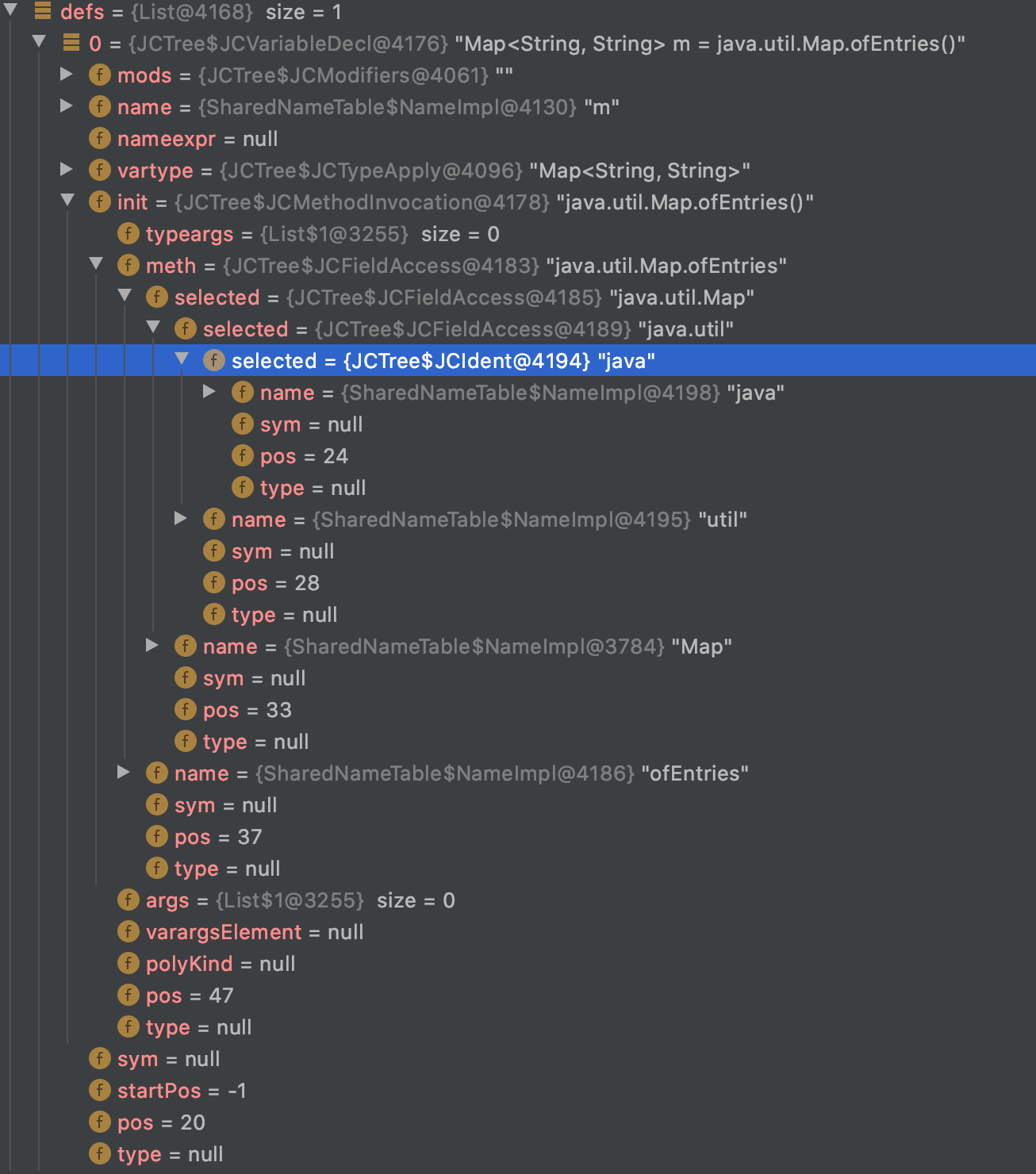
Allow to omit the new keyword
Object a = Object()
